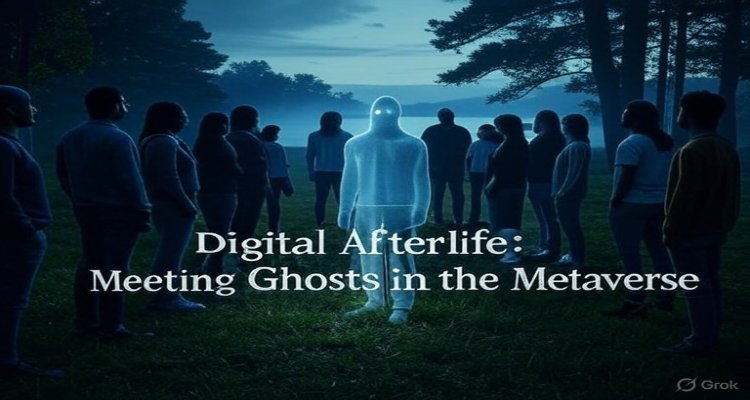Digital Afterlife: Meeting Ghosts in the Metaverse

Digital afterlife” in the metaverse lets people reconnect with lifelike avatars of the deceased—reshaping memory, grief, and the meaning of immortality
Introduction: A New Kind of Eternity
What if death was no longer the end, but the beginning of a new kind of presence? In the digital age, the idea of an afterlife is being reshaped—not by religion or philosophy, but by technology. The “digital afterlife” is no longer science fiction. From AI-powered avatars to metaverse memorials, people are finding ways to connect with the digital echoes of their loved ones, raising profound questions about memory, identity, and mortality.
Context & Background: From Memories to Metaverse
The concept of preserving the essence of the dead has existed for centuries, through rituals, photographs, and biographies. But the digital revolution changed the equation. Social media platforms like Facebook introduced “memorialized accounts,” allowing users to leave digital footprints that outlive them. AI companies have gone a step further, creating chatbots trained on personal data that mimic the voice, style, and personality of the deceased.
Now, the metaverse—an immersive 3D virtual world—has become the next frontier. Families are building virtual memorials, complete with lifelike avatars of the departed, where visitors can “meet” their loved ones, talk to them, or simply sit in their presence.
Main Developments: Technology That Bends Time
Several startups are already experimenting with digital immortality. Companies like HereAfter AI and DeepBrain have introduced tools that allow people to record stories and memories that can be accessed by future generations in interactive form. In South Korea, a VR documentary titled Meeting You gained global attention in 2020, when a grieving mother was reunited with a virtual version of her late daughter.
In the metaverse, such experiences are becoming more common. Virtual cemeteries are being developed where families can visit, share memories, and even celebrate anniversaries. For some, this brings comfort and healing. For others, it blurs the line between reality and simulation in unsettling ways.
Expert Insight & Public Reaction
Digital ethicists caution that while this technology offers solace, it also raises psychological and moral dilemmas. Dr. Eleanor Marks, a digital culture researcher, notes: “When we create avatars of the deceased, we’re not just preserving memories—we’re creating simulations that could alter how we process grief.”
Public reaction is divided. Some embrace the idea of eternal connection. A Reddit user shared, “Talking to my father’s AI avatar helped me cope in ways therapy couldn’t.” Others worry about exploitation: “What happens if companies start monetizing grief by charging for interactions with digital ghosts?”
Impact & Implications: Redefining Life and Death
The rise of the digital afterlife has far-reaching implications.
- For families: It offers new forms of remembrance and healing, but also the risk of prolonged attachment that may hinder closure.
- For society: It challenges legal and ethical frameworks—who owns a person’s digital identity after death?
- For technology: It pushes the boundaries of AI, VR, and data privacy, raising urgent questions about consent, ownership, and misuse.
As the metaverse evolves, the possibility of “meeting ghosts” may become normalized. Yet, societies will need to decide how much control technology should have over one of humanity’s most sacred experiences: death.
Conclusion: A Future Between Memory and Immortality
The digital afterlife is not just about innovation—it’s about how we, as humans, redefine connection, loss, and eternity. Meeting a digital ghost may one day feel as natural as browsing old photographs, but it also forces us to confront a profound question: should immortality be coded into existence, or should some parts of life remain untouched by technology?
The answer, much like death itself, remains uncertain.
Disclaimer : This article explores emerging technological trends and their societal impact. It does not endorse or promote specific services related to digital afterlife experiences. Readers are advised to approach such technologies with personal discretion and ethical consideration.










